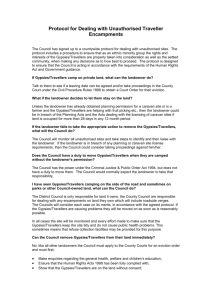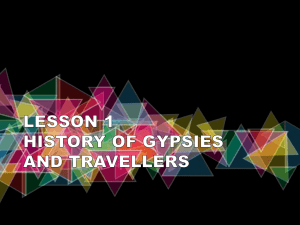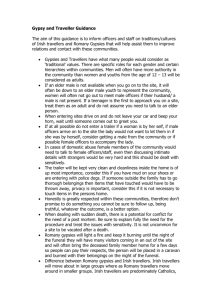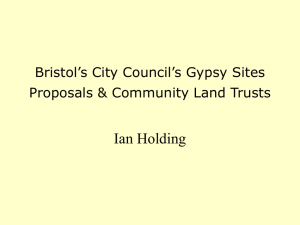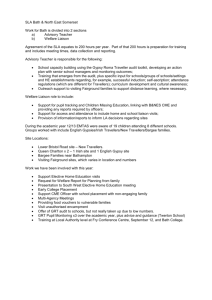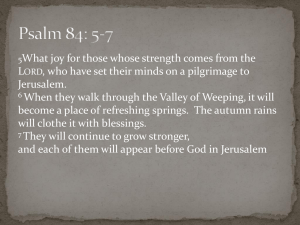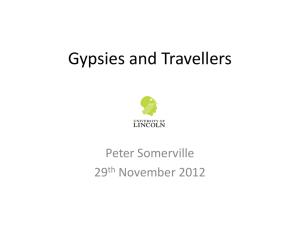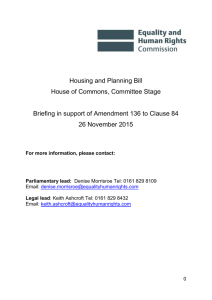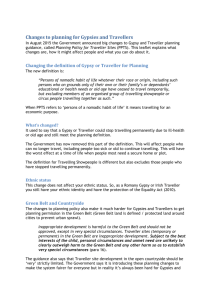Unauthorised Gypsy/Traveller Encampments
advertisement
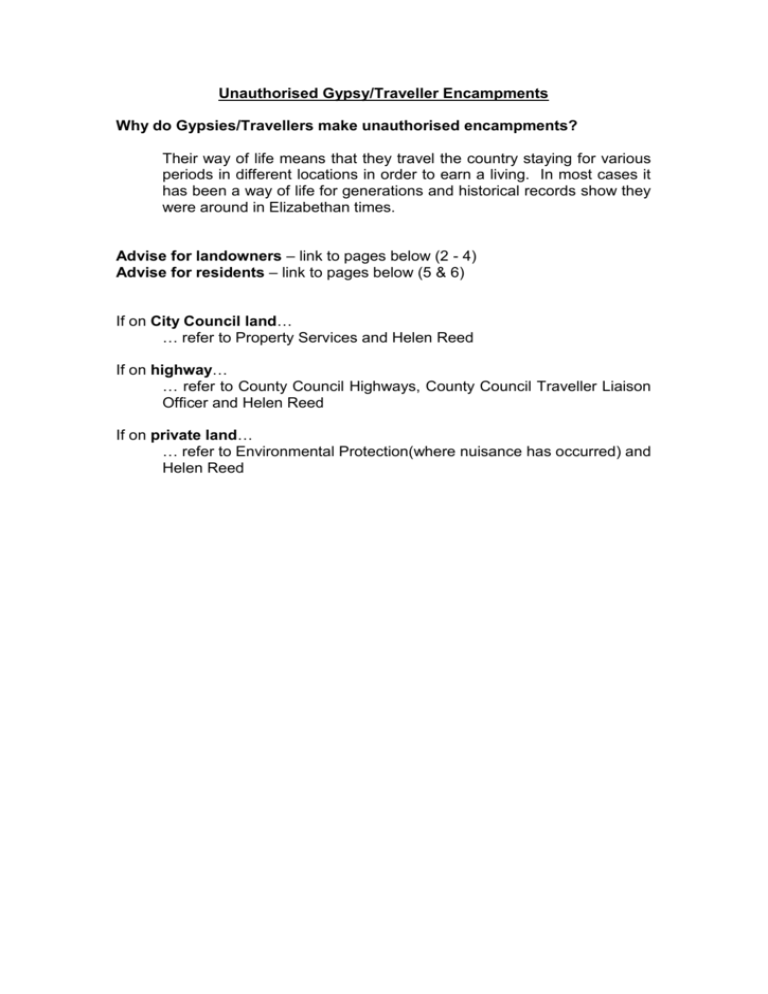
Unauthorised Gypsy/Traveller Encampments Why do Gypsies/Travellers make unauthorised encampments? Their way of life means that they travel the country staying for various periods in different locations in order to earn a living. In most cases it has been a way of life for generations and historical records show they were around in Elizabethan times. Advise for landowners – link to pages below (2 - 4) Advise for residents – link to pages below (5 & 6) If on City Council land… … refer to Property Services and Helen Reed If on highway… … refer to County Council Highways, County Council Traveller Liaison Officer and Helen Reed If on private land… … refer to Environmental Protection(where nuisance has occurred) and Helen Reed Advice for landowners Does the council have a duty to move Gypsies/Travellers when they are camped without the landowner's permission? No. If Gypsies/Travellers are camped on Council land, the council can evict them, but if the encampment is on private land, it is usually the landowner's responsibility. What do I do if Gypsies/Travellers come to my land? The first thing to do is to talk to the Gypsies/Travellers to make it clear that this is actually your land. Ask why they are there, and how long they are hoping to stay. Assess if they are causing a disturbance. If the encampment has spread onto a Right of Way or Highway, you should contact Cambridgeshire County Council. It is a good idea to inform your solicitor of the situation and to ask about likely legal costs. What if the Gypsies/Travellers won’t talk to me? Most Gypsy and Traveller families welcome the opportunity to speak to other members of the community. Bear in mind though that Travellers face a lot of intolerance and racism and may be cautious at first about talking openly. If you feel negotiations are not going well, leave discussion be for the time being and seek advice from your solicitor. If there aren't any problems, is it ok to let them stay? Some landowners are happy to let small groups stay where good relations are established early and there are no major problems. Some welcome the contribution Gypsy and Traveller culture makes to trade and community life - even if just for a short time. Long-term occupation will require planning permission. What if I need to reclaim possession of my land? Your solicitor will most likely advise that possession be sought in the Civil Courts under Part 55 of the Civil Procedure Rules. This will involve: - Asking trespassers to leave (landowners responsibility) - Issuing and serving a court summons - Seeking a possession order in court - Serving the possession order, and, if necessary - Executing a warrant for possession with County Court Bailiffs Usually, once an order is served, Gypsies/Travellers will vacate independently. You can engage private bailiffs to remove unauthorised occupiers without a possession order in some cases. Please note that when proceedings are undertaken in the County Court under the Civil Procedure Rules 1998 to obtain a Court Order for eviction, there must be a minimum of two clear days between service of documents and the Court hearing. What will this cost me? Your solicitor will charge their own fees, so check costs first. Disposing of rubbish will be at your own cost but Refuse and Environment Service can offer you a quote for the work if you prefer. What can the Police do? The Police will visit all sites reported to them but trespass is a civil offence and not a criminal offence. Prevention of Trespass and the removal of trespassers are the responsibilities of the landowner and not the Police. Cambridgeshire Police carefully assess each incident of unauthorised camping and, under Department for Communities and Local Government and Home Office guidelines, act proportionately. The Police have powers to move Gypsies/Travellers off land where criminal activity by Gypsies/Travellers can be established - just as crime committed by settled people has to be proven. Police also have discretionary powers to direct Travellers off land where group behaviour goes against the Criminal Justice and Public Order Act 1994. In certain circumstances (for example, where the Gypsies/Travellers have with them six or more vehicles), officers may use powers under Section 61 of the Criminal Justice and Public Order Act 1994. These powers will only be used in situations of serious criminality or public disorder not capable of being addressed by normal criminal legislation and in which the trespassory occupation of the land is a relevant factor. The Police are bound by the Human Rights Act and may be constrained to avoid using Section 61 of the Criminal Justice and Public Order Act 1994 in circumstances where it would preclude welfare considerations from being applied by the civil courts. If the landowner fails to take the appropriate action to remove the Gypsies/Travellers, what will the Council do? If the landowner is in breach of any planning or license requirements, then the Council will take proceedings against the landowner that require removal of the unauthorised encampment. I own the land, what can I do to stop Gypsies/Travellers camping on it? Gypsies/Travellers have to be able to pull caravans onto the site, any of the following works will help to make this difficult: - Ploughing the land so vehicles sink in - Digging ditches and/or making earth embankments - Reducing access width and/or headroom by the use of barriers - Placing securely locked gates across the entrance - Using the land for some purpose that makes it unsuitable to live on Advice for residents What happens when Gypsies and Travellers visit the neighbourhood? Most of the time, Gypsies and Travellers like to keep themselves to themselves. In some situations (such as a wedding or a funeral, if a relative is in hospital, or if they have broken down), they may have to stop closer to residential areas. Each case is taken on its own merit following Department for Communities and Local Government guidelines. I have seen Gypsies/Travellers camping on the side of the road and sometimes on parks or other Council-owned land, what can the Council do in these cases? The Council will consider each case individually. In all cases the site is visited and every effort made to make sure that the Gypsies/Travellers keep the site clean and tidy. This sometimes means that refuse collection facilities may be provided for this purpose. We cannot remove unauthorised encampments from their land immediately, and must act according to national legislation and guidelines by: - Showing that the Gypsies/Travellers are on the land without consent - Making enquiries regarding the general health, welfare and children's education - Ensuring that the Human Rights Acts 1998 has been fully complied with - Following a set procedure in terms of proving ownership of land and details of the illegal encampment that will enable them to successfully obtain the necessary authority from the Courts to order the Gypsies/Travellers to leave the site. It is possible that the land may be owned by the County Council, if so it would be their responsibility to remove the Gypsies/Travellers from their land. What should I do if I suspect that an encampment is unauthorised? We can pass information on to the Traveller Liaison Officer (Helen Reed), however the Council can only take enforcement action when an unauthorised encampment is on City Council-owned land but we will notify other landowners and advise them on their rights and responsibilities where necessary. How long will it take for the Gypsies/Travellers to be removed? This will depend upon the circumstances of each individual case. The Council will need to take account of the issues outlined above as well as how soon they can obtain a Court hearing date. Can the Court refuse to grant the Council an order to move Gypsies/Travellers on? Yes. If there is an unavoidable reason for the Gypsies/Travellers to stay on the site, or if the Court believes that the Council have failed to make adequate enquiries regarding the general health and welfare of the Gypsies/Travellers. The Council must try to find out this information before going to Court. What can the Police do? The Police will visit all sites reported to them but trespass is a civil offence and not a criminal offence. Prevention of Trespass and the removal of trespassers are the responsibilities of the landowner and not the Police. Cambridgeshire Police carefully assess each incident of unauthorised camping and, under Department for Communities and Local Government and Home Office guidelines, act proportionately. The Police have powers to move Gypsies/Travellers off land where criminal activity by Gypsies/Travellers can be established - just as crime committed by settled people has to be proven. Police also have discretionary powers to direct Travellers off land where group behaviour goes against the Criminal Justice and Public Order Act 1994. In certain circumstances (for example, where the Gypsies/Travellers have with them six or more vehicles), officers may use powers under Section 61 of the Criminal Justice and Public Order Act 1994. These powers will only be used in situations of serious criminality or public disorder not capable of being addressed by normal criminal legislation and in which the trespassory occupation of the land is a relevant factor. The Police are bound by the Human Rights Act and may be constrained to avoid using Section 61 of the Criminal Justice and Public Order Act 1994 in circumstances where it would preclude welfare considerations from being applied by the civil courts.

